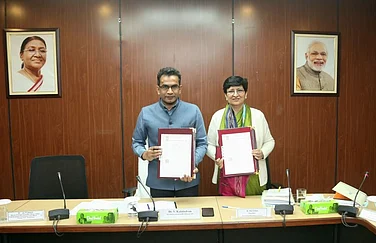In a world that glorifies hustle and sleepless nights, this study should come as a wake-up call: sleep isn’t just rest; it’s resilience. And protecting your brain from premature aging might just begin with turning off the lights and getting good sleep. This is what a groundbreaking study has revealed. Chronic insomnia—difficulty sleeping for at least three nights a week for three months or more—may speed up declines in memory and thinking skills, raising the risk of dementia by 40%.
With millions struggling to catch quality sleep, these findings spotlight how poor sleep could be silently undermining brain health over time.
Published in Neurology, the flagship journal of the American Academy of Neurology, the study tracked nearly 2,750 cognitively healthy older adults over 5.6 years. The researchers found that those suffering from chronic insomnia experienced memory and cognitive declines equivalent to an extra 3.5 years of brain aging.
Those who perceived they were getting less sleep than usual showed cognitive performance akin to someone four years older, alongside troubling brain changes visible on scans—including increased amyloid plaques and white matter damage, both markers linked to Alzheimer’s disease.
“Our findings suggest that insomnia doesn’t just make you feel groggy the next day—it may be an early warning sign or even a contributor to future cognitive problems,” said Dr. Diego Z. Carvalho of the Mayo Clinic, lead author of the study. “Treating chronic insomnia isn’t just about better sleep—it could be key to protecting brain health as we age.”
This study’s implications ring alarm bells not just for the elderly but for Indian youth as well. Recent surveys show a sharp rise in sleep disorders among young Indians, with nearly one in three suffering from some form of sleep-related issue. According to a 2022 AIIMS report, over half of surveyed students reported poor sleep quality, and insomnia rates have doubled compared to 15 years ago.
Dr. (Prof.) Kunal Bahrani, Director and Head of Neurology at Marengo Asia Hospitals, Faridabad, warns: “Sleep is not a luxury—it is a fundamental neurological function as critical as breathing. Yet, more and more young people sacrifice it in the name of productivity or entertainment, fueling what I call a silent epidemic of sleep disorders in clinics, hostels, and workplaces.”
He advises parents and youth alike to maintain a consistent sleep schedule, avoid screens at least an hour before bed, and limit caffeine intake after mid-afternoon—since caffeine can linger in your system for 5 to 6 hours, disrupting sleep patterns.
Adding to the concern, other research links chronic insomnia and sleep deprivation with inflammation markers such as cytokines and C-reactive protein, known contributors to heart disease and diabetes, underscoring how poor sleep can ripple through overall health.



























